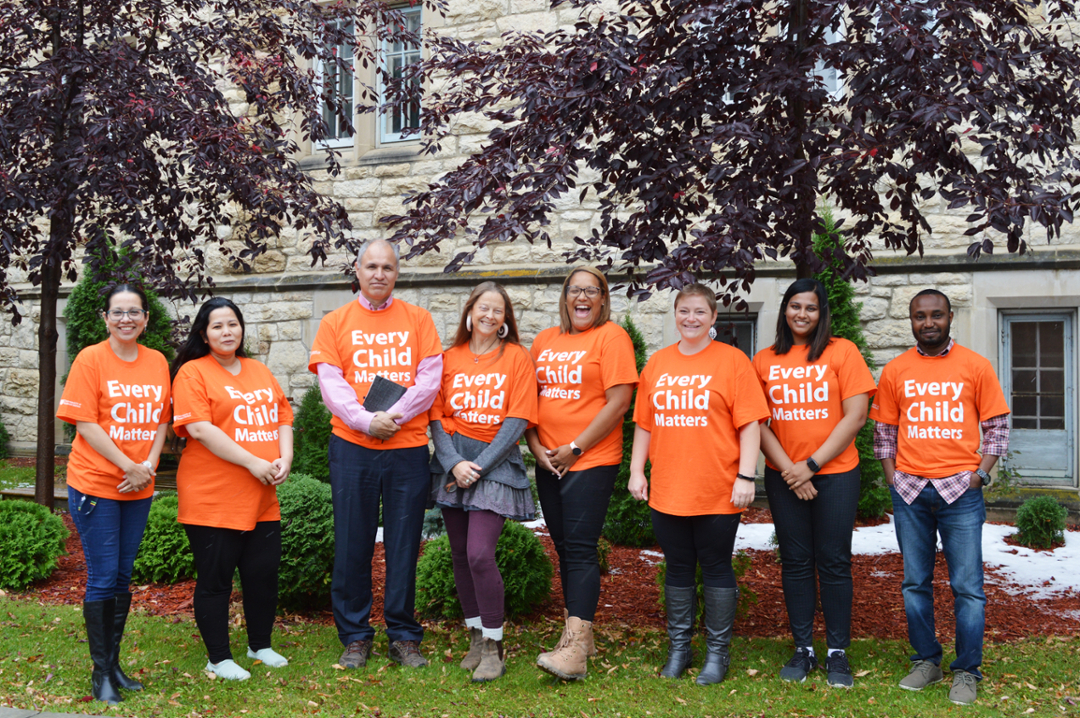
New Indigenous Health and Wellness team to support health needs in First Nations and Métis communities
A new research group aims to change the narrative around Indigenous health and wellness by giving a stronger voice to Indigenous people.
By Sarah MacDonaldThe Indigenous Wellness Research Group, led by Dr. Alexandra King, Cameco Chair in Indigenous Health and Wellness, will be working with First Nations and Métis communities across Saskatchewan to support community-based research and healthcare initiatives.
“There is a very deficit-based narrative that exists about Indigenous people, very pathology-based, whereas when we speak to many Indigenous people, they see themselves as quite well, and they see their communities as well,” Dr. King said.
The team collaborates with First Nation and Métis communities, supporting them as they undertake their own health and wellness research. Indigenous wellness, as defined by each community, is their major focus. HIV/AIDS and hepatitis C, along with oft-related issues, are also prioritized.
The Indigenous Wellness Research Group includes research manager Walter Smith; project officers Kehinde Ametepee and Claudia Madampage; communication coordinator Sarah MacDonald; research associates Kristin Dunn, Subhashini Iyer, and Priya Shah; executive assistant Bren Thompson; and clerical assistant Linda Johnson.
Dr. King, and her husband, Prof. Malcolm King, who teaches in the Department of Community Health & Epidemiology and is the scientific director of the Saskatchewan Centre for Patient-Oriented Research (SCPOR), work closely together on all of their research.
“The Indigenous Wellness Research Group is astounding, really quite talented,” Dr. King said. “Each person who has come into our team has a variety of different strengths that they offer and we will build upon.”
Since June, Dr. King and her team have visited La Loche, Île-à-la-Crosse, Pinehouse, La Ronge, Sturgeon Lake First Nation, and the Treaty 4 gathering site in Fort Qu’Appelle. They have been actively engaging and communicating with Indigenous communities in Saskatchewan on building local research capacity.
Self-determination and cultural responsiveness, Ethical Space, and Two-eyed Seeing are among the major frameworks employed by the Indigenous Wellness Research Group and the communities. For Indigenous people, these are important principles that respect their cultures and traditions. They will be taking control of their own health and wellness and the accompanying research in ways that reflect their cultures.
Ethical Space, a theoretical space between cultures and worldviews that allows for respectful relations and dialogue, needs to be created when peoples with disparate worldviews engage with each other, as will be the case when some of the non-Indigenous researchers work with the communities. Two-eyed Seeing, which means bringing together Indigenous and Western worldviews or forms of knowledge, will ensure the best practices from both cultures are employed rather than prioritizing one over the other.
“For Indigenous people, relationships are very important, so we’re building these relationships as individuals, and also as a group,” Dr. King said. “We have been fortunate to not only go and visit these communities, but we have been welcomed into them. We have engaged in cultural activities, in ceremony, and that, of course, is completely transforming our thinking about what we need to be doing here.”
Current projects that are being undertaken by the research group include miyo pimâtisiwin, a CIHR-funded project that is establishing a few community-based Indigenous knowledge development centres; a CIHR-funded project to study the INSTI HIV self-test among people at risk for HIV/AIDS; and Peers4Wellness, a CIHR funded project to explore Indigenous approaches to wellness support for Indigenous women living with HIV and HCV.
Dr. Alexandra King and a large team of investigators from Saskatchewan and Manitoba were recently awarded a $2.84M CIHR grant for Wuniska, a regional centre for HIV/HepC/STIBBI research with Indigenous people. It will be one of the major projects the Indigenous Wellness Research Group undertakes.
Dr. King said she hopes the grants, including the INSTI HIV self-test and Wuniksa, will help people who have difficulty connecting to healthcare resources, be it for geographical or situational reasons. She also wants to identify practices that are successful and expand on them.
“A lot of the research I do is very applied, very much knowledge to action, and also studying that which works, so action to knowledge. How do we learn from that and scale it up?” she said.
Sarah MacDonald is the communications coordinator for the Cameco Chair in Indigenous Health and Wellness. She can be reached at sarah.macdonald@usask.ca.
